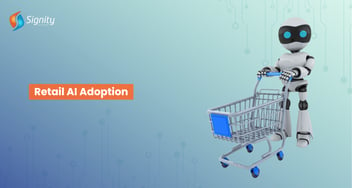How can AI Benefit the Retail Industry?
AI solutions for retail and e-commerce drive personalization, inventory accuracy, and predictive analytics, tackling industry pain points like demand fluctuations and supply issues. Discover how AI can enhance your retail and e-commerce experience with this blog.
.png?width=670&height=445&name=microsofts-recall-feature%20(20).png)
The retail and e-commerce landscape is undergoing a remarkable transformation with the integration of artificial intelligence (AI).
From creating personalized shopping experiences to optimizing supply chains and improving customer interactions, AI services for retail and e-commerce are redefining how businesses operate and how customers shop and make decisions.
According to a recent study by Accenture, a staggering 75% of retail executives believe generative AI is key to boosting their revenue. AI's advanced solutions and capabilities are no longer a luxury but a necessity for businesses to thrive in this competitive landscape.
In this blog, we’ll delve into the top benefits of AI for the retail and e-commerce industry and explore how businesses can leverage this technology to stay ahead in an ever-evolving market.
Key Takeaways
- AI-driven personalization engines analyze customer behavior. This helps businesses offer personalized recommendations, promotions, and product suggestions.
- Predictive analytics in AI helps retail and e-commerce industries forecast demand accurately. This reduces stockouts and overstock situations, ensuring products are available when customers want them.
- Retailers can engage customers more effectively by using advanced customer segmentation, targeted marketing, and AI-powered chatbots while improving conversion rates.
AI fraud detection tools protect transactions by spotting suspicious activity in real-time. This helps reduce losses and builds customer trust in secure transactions.
AI Applications in Retail & E-commerce
AI significantly impacts every sector, and retail is no different. With new tools and improvements, AI helps retail businesses work better and create a better experience for customers.
Here are some advantages of AI solutions for retail and e-commerce:
1. MAP Analysis
One of the most exciting features that AI offers to the retail and e-commerce industry is MAP analysis.
MAP analysis is the "Minimum Advertise Price," which is the lowest price that any retail business owner can quote to sell a product.
Any products that are sold at a lower price than the MAP price can have an adverse effect on retailers' business. Therefore, AI lets you analyze the MAP price along with the capability of tracking the sellers who play around it.
This certainly helps businesses prevent variations of their MAP by tracking and monitoring the products in real time.
2. Streamlined Operations
Retail and e-commerce stores have complex operations. When it comes to managing the warehouses and store operations, management becomes complex.
This is because the manager's job is not only restricted to managing inventories, stocking goods, and managing them. They are also required to endow themselves with product information, handle merchandising, and keep track of all promotional offers.
AI streamlines these operations by automating the back office activities and leveraging robotics for quality checks. This way, they can all save their time by using it for more productive tasks.
3. Personalized Marketing and Customer Targeting
Personalized marketing campaigns are essential for retailers to target customers. For this, they need to analyze customer behavior and other data about their customers to conduct that.
And certainly, it's not only about analyzing this but also about leveraging computer vision.
58% of retailers use generative AI to create assets for ads, emails, social media, and websites.
Computer vision enables customers to search items using images rather than just using the search terms. This enables the e-commerce and retail industry to leverage advanced visual analysis and recognition capabilities.
Businesses can use this to determine and track customer demographics, behavior, and emotions that enable them to provide more personalized recommendations.
Also, by using AI algorithm capabilities, businesses can customize their marketing messages to each customer. This allows more effective marketing campaigning and higher conversion rates at reduced marketing costs.
Moreover, AI chatbots and conversational AI help businesses engage customers by providing quick answers and personalized suggestions.
According to research by Accenture, an overwhelming 93% of retail CxOs are planning to scale up their investments in AI and generative AI over the next 3–5 years in terms of time, money and human capital.
4. Sales Forecasting
Accurate sales forecasting is vital for retail and e-commerce businesses. Companies often struggle to predict customer demand because products and preferences change frequently.
AI solutions for ecommerce helps improve sales forecasting. It analyzes past, current, and future sales data that allows businesses to make better predictions.
AI can also track shifts in customer demand and market changes that could affect sales. This ability to forecast accurately ensures that businesses have the right products available when customers need them.
Recommended Read- Streamline Decision-Making with AI-Generated Data Reports
5. Personalized Customer Experiences
Retail AI solutions are helping businesses better understand their customers by comprehending their behavior and shopping patterns, as well as by using predictive analysis to offer them more tailored services and recommendations.
Do you know that around 72% of customers engage with personalized messaging?
And that is what AI provides you with!
By analyzing customer behavior and identifying their shopping patterns, you can send more personalized offers to the customers, leading to better engagement and enhanced sales.
6. Chatbots and Virtual Assistants
In the retail and e-commerce industry, virtual assistants and chatbots provide tasks like order tracking, issue resolution, product recommendations, and more.
Since, in the case of human customer support, people cannot stay 24X7 available, AI chatbots are bridging the gaps by staying available all the time.
Not just this but the chatbots are consistently evolving, providing a more personalized and human-like communication experience.
They leverage natural language processing to understand and respond to customer queries. It also provides instant customer support, assists with buying decisions, and addresses inquiries. This leads to greater customer satisfaction, which ultimately leads to higher sales.
Don't trust words? A study by Forbes shows that chatbots and virtual agents boost sales by 67%.
7. Easy Customer Segmentation
Customer segmentation is an important retail strategy that uses AI to group customers based on their behaviors, preferences, demographics, and purchase history.
Machine learning and data analysis help retailers find patterns in large sets of data. This allows them to create targeted marketing campaigns, customized product recommendations, and tailored promotions for each group.
Focusing on specific customer requirements improves the shopping experience, increases customer engagement, and boosts conversion rates.
Customer segmentation also helps with managing inventory and developing products. It provides insights into which products and features appeal to different groups. This leads to driving revenue growth and customer satisfaction.
8. Predictive Maintenance
Predictive maintenance is an important use of AI in retail and e-commerce. It uses machine learning algorithms like random forests, Support Vector Machines, or convolutional neural networks to predict and prevent equipment failures.
By evaluating the past data from devices and sensors, AI models can predict when equipment needs maintenance. This helps retailers and e-commerce businesses reduce downtime, plan repairs in advance, and lower costs. Overall, AI improves efficiency and enhances customer satisfaction by avoiding disruptions.
Recommended Read: Cost-Effective AI Solutions for Your eCommerce Business
9. Customer Sentiment Analysis
AI solutions for retail and e-commerce employ Natural Language Processing (NLP) for Customer Sentiment Analysis, which evaluates opinions in reviews and social media.
With this, AI categorizes feedback as positive, negative, or neutral and examines specific aspects like product quality and customer service.
This understanding aids businesses in making informed decisions, improving products, enhancing customer experiences, and addressing issues, ultimately boosting customer satisfaction and loyalty.
10. Early Fraud Detection and Prevention
Fraud detection uses advanced algorithms to analyze transaction data and find possible fraud.
This process continuously monitors payment transactions, customer behavior, and patterns to spot unusual activities, such as strange buying habits, high-risk IP addresses, or mismatched card details.
AI-driven fraud detection systems use ML and pattern recognition to improve their ability to identify new fraud techniques. By quickly flagging suspicious transactions, retailers can reduce financial losses, lower chargebacks, protect customers, and maintain trust in their online operations.
11. Customer Lifetime Value Prediction
Customer Lifetime Value (CLV) prediction helps businesses estimate the future value a customer is expected to generate over their entire relationship with a company.
AI models use ML techniques like Recurrent Neural Networks (RNNs) or Gradient Boosting Machines (GBMs) to look at past customer data, which includes browsing habits, purchase history, demographics, and interaction patterns.
These algorithms create CLV predictions that allow businesses to make smart choices about customer groups, targeted marketing, and resource use. This helps them increase long-term profits, boost customer engagement, and build loyalty.
12. Enhanced Supply Chain Efficiencies
One key benefit of artificial intelligence (AI) is its ability to help people with routine and time-consuming tasks.
According to SnapLogic, 61% of employees believe that using AI at work increases productivity. This is also true in retail.
For example, AI can assist logistics drivers in finding the best delivery routes. Robots can handle picking and packing orders, allowing employees to focus on more important tasks.
AI development services are equipping the retail and e-commerce industry with a myriad of benefits. Retail companies are also using computer vision and product recognition software in their warehouses.
13. Catching Shoplifters
The issue of shoplifting represents a significant concern for retailers, especially given the recent media attention surrounding inventory shrinkage caused by theft and related criminal activities.
AI tools offer effective solutions to address this problem in physical stores.
For example, during self-checkout, technologies like object detection and motion analytics can help stop theft in real-time. This technology can detect shoplifters trying to skip the scanning process.
Popular Examples Leveraging AI in Retail & E-commerce Industry
AI has great potential, and it has impacted many sectors, including retail and e-commerce. While some retail and e-commerce businesses are still unsure about using AI, many others have successfully integrated it into their operations to benefit from this technology.
1. Amazon
Amazon is a popular online shopping site that uses advanced technology to improve the customer experience. It combines sensors, AI, and computer vision to allow customers to shop without the usual checkout process. This AI system makes shopping easy and quick, providing both efficiency and convenience.
2. Walmart
Walmart, one of the largest retailers, uses AI-powered store assistants to improve its operations and customer service. These assistants use machine learning to check inventory levels, identify items that need restocking, and track product availability. By using AI, Walmart has made its operations more efficient, improved store performance, and enhanced the shopping experience for customers.
Conclusion
The benefits of using AI in the retail and e-commerce market are endless. From enhancing customer experiences to providing in-depth insights into data and improving productivity, implementing AI can enhance overall business proficiency.
The future of AI is likely to grow significantly. However, fully using its potential can be challenging.
AI-Powered Solutions for Retail Success
Partner with us to integrate cutting-edge AI into your retail business. Deliver personalized experiences, streamline operations, and achieve your goals effortlessly!
According to a report by Accenture, nearly a third of retail executives (31%) think a lack of skills will stop their companies from fully using generative AI. Over a third (36%) worry that workers won’t use the technology because they don’t understand it.
To help you harness the full power of AI, Signity Solutions offers advanced solutions with a skilled team of development professionals.


%201-1.webp?width=148&height=74&name=our%20work%20(2)%201-1.webp)


.png?width=344&height=101&name=Mask%20group%20(5).png)

















